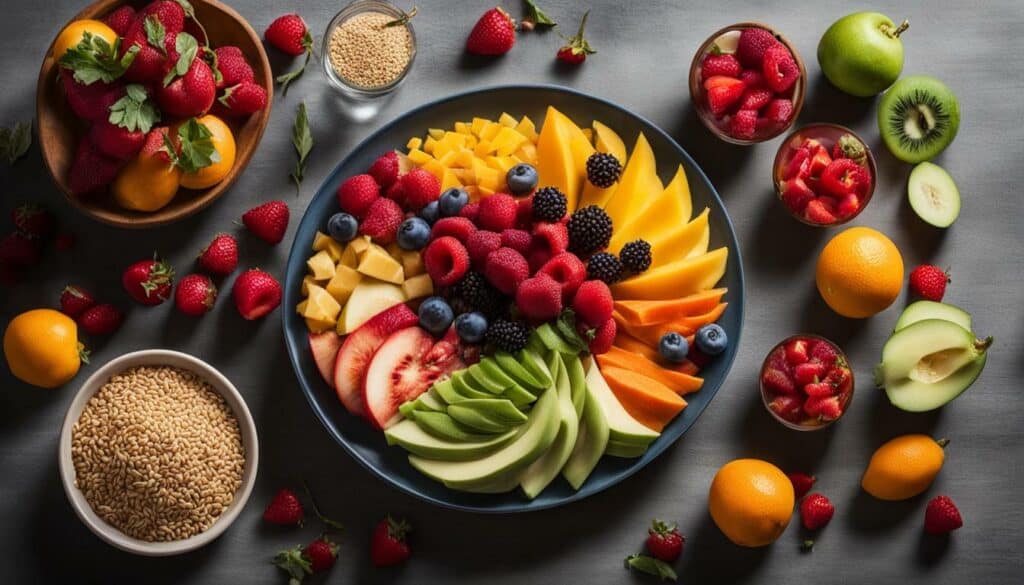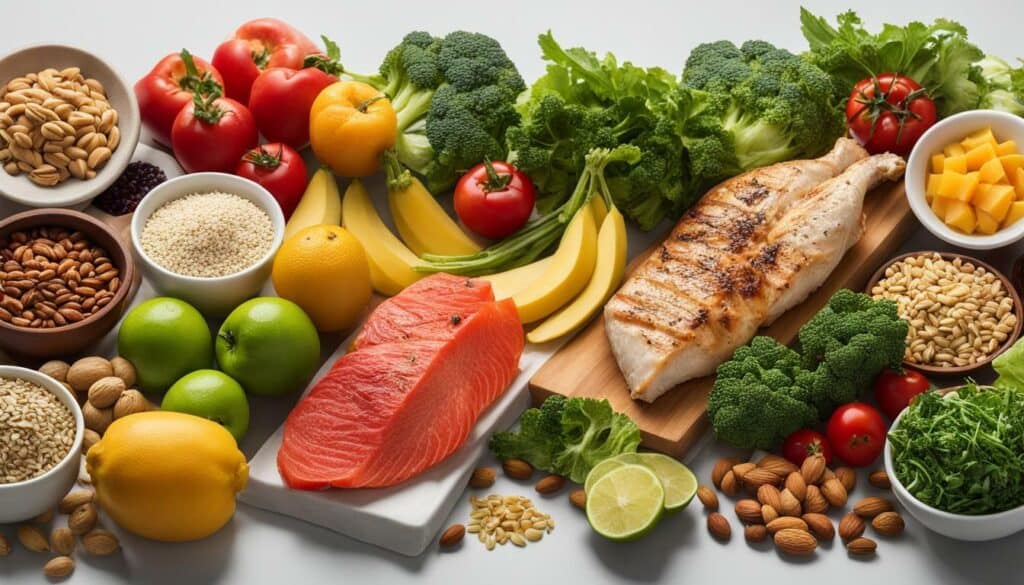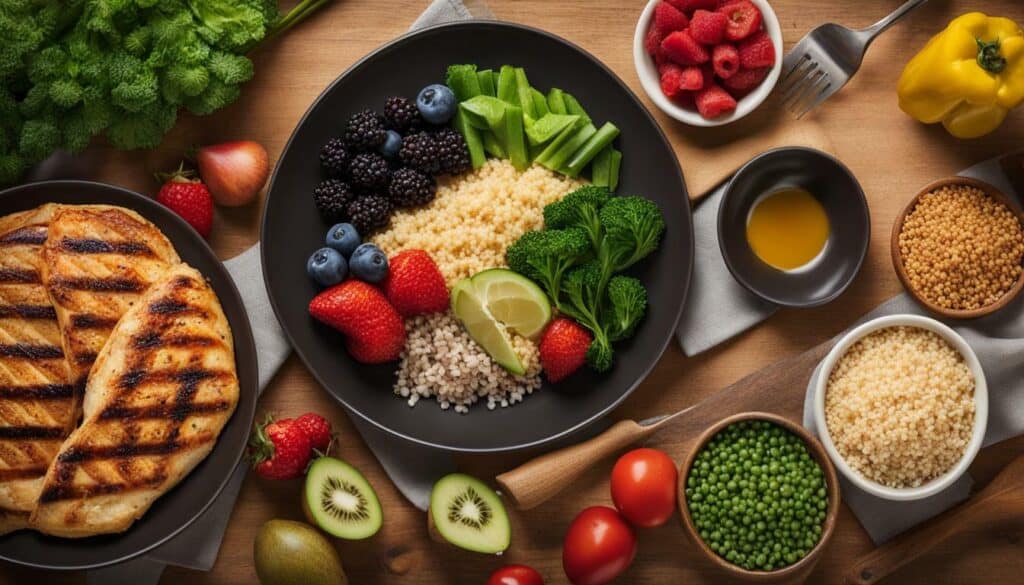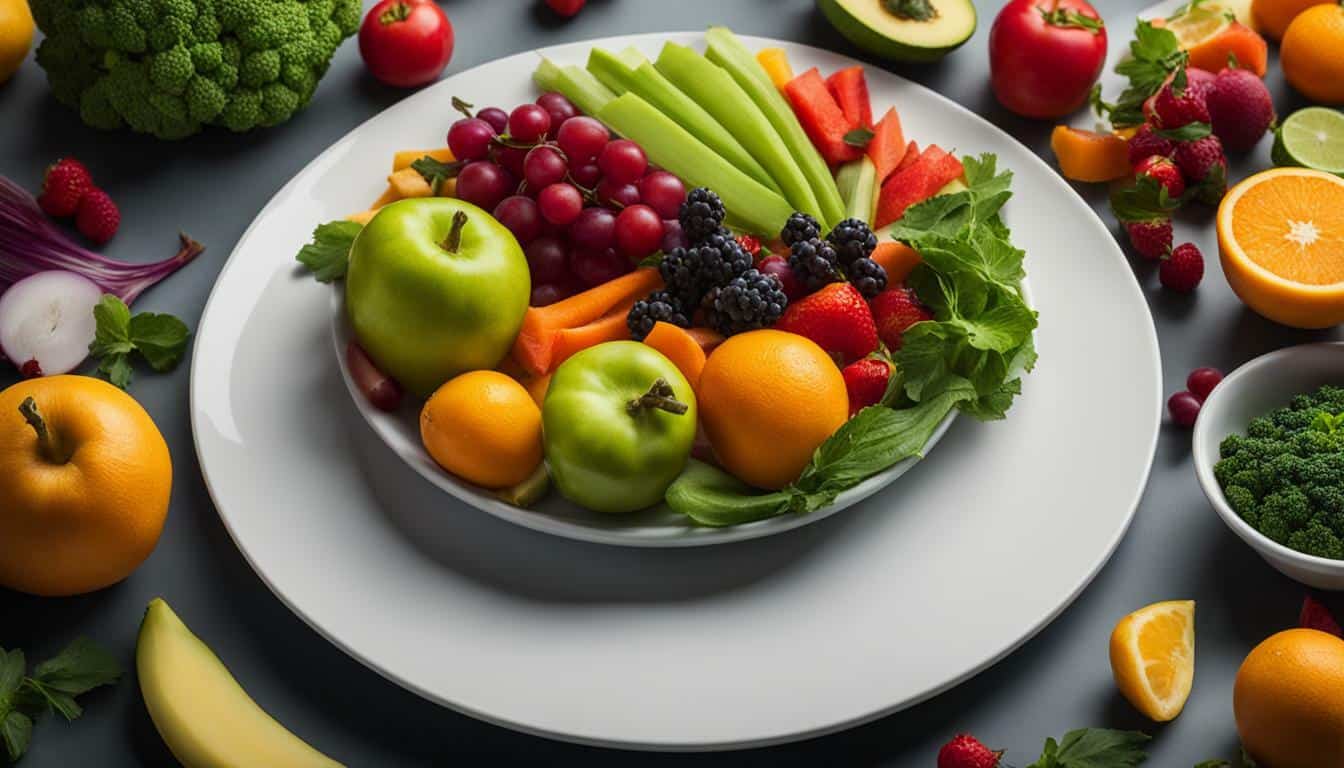Welcome to my comprehensive guide on mastering your nutrition and learning all the basics of healthy eating. By gaining knowledge about proper nutrition, you can take control of your health and embrace a healthier lifestyle.
Healthy eating is important for various reasons. It fuels our bodies, provides necessary nutrients, lowers disease risk, increases longevity, and promotes optimal mental and physical well-being. Rather than following a specific diet, healthy eating is about prioritizing nutrient-dense foods. Nutrient density refers to the amount of nutrients in a food compared to the calories it provides. To support gut health, maintain a healthy weight, and protect against chronic disease, it’s crucial to eat a variety of foods.
Key Takeaways:
- Healthy eating fuels the body, provides essential nutrients, lowers disease risk, and promotes overall well-being.
- Nutrient-dense foods should be prioritized to maximize the intake of necessary nutrients.
- Eating a variety of foods supports gut health, helps maintain a healthy weight, and protects against chronic diseases.
- The balance of macronutrients (carbs, fat, and protein) contributes to satiety and taste in meals and snacks.
- Highly processed foods should be limited, while whole, nutrient-dense foods have beneficial effects on health.
The Importance of Healthy Eating
Understanding the importance of healthy eating is the first step towards improving your overall well-being. By adopting healthy eating habits and making conscious food choices, you can positively impact your health and vitality.
Fueling your body with nutrient-dense foods is essential for optimal functioning. Nutrient density refers to the amount of nutrients in a food in relation to the calories it provides. By prioritizing nutrient-dense foods, you can acquire the necessary vitamins, minerals, and antioxidants your body needs to thrive. This can help boost your immune system, support gut health, and protect against chronic diseases.
Healthy eating doesn’t have to be complicated or restrictive. It’s about finding a balance and incorporating a variety of foods into your diet. By including a colorful array of fruits, vegetables, whole grains, lean proteins, and healthy fats in your meals, you can ensure that your body receives a wide range of nutrients.
When it comes to healthy eating, moderation is key. While it’s important to limit highly processed foods due to their link to increased disease risk, it’s equally important to remember that certain foods don’t have to be completely eliminated from your diet. By making informed choices and finding a balance, you can enjoy your favorite treats while still prioritizing your health.
Healthy Eating Tips
- Fill half your plate with fruits and vegetables to ensure you’re getting a variety of vitamins and minerals.
- Choose whole grains over refined grains, as they are higher in fiber and provide more nutrients.
- Incorporate lean proteins like chicken, fish, tofu, or legumes into your meals to support muscle growth and repair.
- Include good fats, such as avocados, nuts, and olive oil, which can help reduce inflammation and support brain health.
- Drink plenty of water throughout the day to stay hydrated and support overall bodily functions.

| Food Group | Recommended Serving Size |
|---|---|
| Fruits and Vegetables | 5-9 servings per day |
| Whole Grains | 3-6 servings per day |
| Lean Proteins | 2-3 servings per day |
| Healthy Fats | Aim for 2-3 servings per day |
| Water | 8 cups (64 ounces) per day |
Nutrient Density and Balanced Diet
Achieving a balanced diet is crucial for providing your body with the necessary nutrients it needs to function optimally. By focusing on nutrient-dense foods, you can ensure you’re getting the most bang for your buck when it comes to nourishing your body.
But what exactly does it mean for a food to be nutrient-dense? Nutrient density refers to the amount of nutrients in a food in relation to the calories it provides. Foods that are high in nutrients and low in calories are considered to be nutrient-dense. These foods pack a nutritional punch, providing a wide range of vitamins, minerals, and antioxidants that are essential for good health.
When building a balanced diet, it’s important to include a variety of nutrient-dense foods. This means incorporating colorful fruits and vegetables, lean proteins, whole grains, and healthy fats into your meals. The more diverse your food choices, the greater the variety of nutrients you’ll be consuming, which can help support good gut health, maintain a healthy body weight, and protect against chronic diseases.
| Nutrient-Dense Foods | Non-Nutrient-Dense Foods |
|---|---|
| Fruits and vegetables | Processed snacks |
| Lean proteins (chicken, fish, tofu) | Sugary beverages |
| Whole grains (quinoa, brown rice) | Fast foods |
| Healthy fats (avocado, nuts) | Sweets and desserts |
By prioritizing nutrient-dense foods and limiting non-nutrient-dense choices, you can improve your overall diet quality and ensure that you’re providing your body with the necessary nutrients it needs for optimal health.

- Harvard T.H. Chan School of Public Health. (2021). The Nutrition Source: Healthy Eating Plate. Retrieved from https://www.hsph.harvard.edu/nutritionsource/healthy-eating-plate/
- Institute of Medicine. (2005). Dietary Reference Intakes for Energy, Carbohydrate, Fiber, Fat, Fatty Acids, Cholesterol, Protein, and Amino Acids. Washington, DC: The National Academies Press.
- United States Department of Agriculture. (2021). MyPlate. Retrieved from https://www.myplate.gov/
The Role of Macronutrients
Understanding the role of macronutrients in your diet is key to creating a healthy and balanced eating plan. By incorporating healthy cooking techniques, you can enhance the nutritional value of your meals while still enjoying delicious flavors.
Macronutrients, also known as carbs, fat, and protein, are the three main components of a well-rounded diet. Each macronutrient plays a vital role in providing energy, promoting cell growth and repair, and supporting various bodily functions.
To ensure optimal health, it’s important to include all three macronutrients in your meals and snacks. Carbohydrates are the body’s primary source of energy and can be found in foods like whole grains, fruits, and vegetables. Healthy fats, such as those found in avocados, nuts, and olive oil, are important for brain function and hormone production. Protein, which is abundant in lean meats, poultry, fish, and legumes, is essential for muscle growth and repair.
The Importance of Healthy Cooking Techniques
When it comes to preparing meals, the cooking techniques you choose can impact the nutritional content of your food. Some methods, such as deep frying or excessive use of added oils, can add unnecessary calories and unhealthy fats to your diet. On the other hand, healthy cooking techniques can help retain the nutrients in your ingredients while still delivering delicious flavors.
Steaming, roasting, grilling, and sautéing are all cooking methods that can help preserve the nutrients in your food. These techniques often require minimal amounts of added fats or oils, making them healthier options. For example, steaming vegetables helps retain their vitamins and minerals, while grilling lean meats allows the fat to drip away, reducing calorie intake.
| Cooking Technique | Advantages |
|---|---|
| Steaming | Retains nutrients |
| Grilling | Reduces fat content |
| Roasting | Enhances flavors |
| Sautéing | Quick and easy |
By choosing healthier cooking methods, you can enjoy meals that are both nutritious and delicious. Experiment with different techniques to find the ones that work best for you and your taste preferences.

Remember, understanding the role of macronutrients and incorporating healthy cooking techniques are essential for creating a well-balanced eating plan. By prioritizing nutrient-rich foods and preparing them in a way that maximizes their nutritional value, you can support your overall health and well-being.
Limiting Highly Processed Foods
Highly processed foods have become a significant part of our modern diet, but they pose a serious threat to our health. By understanding the risks associated with these foods and limiting their intake, you can take a proactive step towards reducing your risk of chronic diseases.
Processed foods are typically high in additives, preservatives, and unhealthy fats, while being low in essential nutrients. They are often packed with refined sugars, artificial sweeteners, and sodium, which can lead to various health problems such as obesity, heart disease, and diabetes.
One way to reduce your consumption of highly processed foods is to prioritize whole, nutrient-dense options. These foods are rich in vitamins, minerals, and fiber, providing your body with the essential nutrients it needs to function optimally. Incorporating more fruits, vegetables, whole grains, lean proteins, and healthy fats into your diet can help promote better health and lower the risk of chronic diseases.
It’s also important to read food labels and be mindful of the ingredients in the products you buy. Avoid items with a long list of unfamiliar ingredients or high levels of added sugars, sodium, and unhealthy fats. Focus on choosing fresh, whole foods whenever possible and opt for homemade meals prepared with real, unprocessed ingredients.

| Health Risks of Highly Processed Foods | Ways to Reduce Intake |
|---|---|
| Obesity | Choose whole, unprocessed alternatives |
| Heart Disease | Read labels and avoid products with excessive sodium and unhealthy fats |
| Diabetes | Limit foods with high added sugar content |
| Inflammation | Incorporate anti-inflammatory foods into your diet |
Embracing Whole, Nutrient-Dense Foods
When it comes to healthy eating, whole, nutrient-dense foods should be at the core of your diet. By embracing whole grains, fresh fruits, and vegetables, you can fuel your body with the vital nutrients it needs to thrive.
Whole grains are an excellent source of fiber, vitamins, and minerals. They provide sustained energy and can help regulate blood sugar levels. Incorporating whole grains like quinoa, brown rice, and whole wheat bread into your meals can support digestive health and promote a feeling of fullness.
Fresh fruits and vegetables are packed with antioxidants, vitamins, and minerals that are essential for overall well-being. They are also low in calories and high in water content, making them an ideal choice for weight management. Try incorporating a variety of colorful fruits and vegetables into your meals to ensure you are getting a wide range of nutrients. From leafy greens to vibrant berries, the options are endless!

In addition to whole grains and fresh produce, don’t forget to include lean proteins and healthy fats in your diet. These can be found in foods such as fish, nuts, seeds, and olive oil. These nutrient-dense foods provide essential fatty acids and help support brain function, heart health, and optimal body function.
Remember, healthy eating is about balance and variety. It’s important to listen to your body and make choices that nourish it. By embracing whole, nutrient-dense foods, you can enhance your overall health and well-being.
| Benefits of Embracing Whole, Nutrient-Dense Foods: |
|---|
| Improved Digestive Health: Whole grains provide fiber that supports healthy digestion. |
| Weight Management: Fresh fruits and vegetables are low in calories and high in water content, helping you feel satisfied. |
| Nutrient-Rich Diet: Whole, nutrient-dense foods provide a wide array of vitamins, minerals, and antioxidants that are essential for overall well-being. |
| Heart Health: Healthy fats found in foods like fish and olive oil promote heart health and reduce the risk of cardiovascular diseases. |
| Brain Function: Nutrient-dense foods support optimal brain function and cognitive health. |
Key Takeaways:
- Incorporating whole grains, fresh fruits, and vegetables into your diet is essential for fueling your body with essential nutrients.
- These nutrient-dense foods provide fiber, vitamins, minerals, and antioxidants that support overall well-being.
- Pair whole grains and fresh produce with lean proteins and healthy fats for a balanced and nourishing diet.
By prioritizing whole, nutrient-dense foods, you can take a proactive approach to your health and well-being. Start making small changes today and witness the positive impact it can have on your overall wellness.
Making Healthy Eating Sustainable
Making healthy eating a sustainable habit is crucial to long-term success. By implementing effective meal planning strategies, incorporating good fats, and exploring various healthy cooking techniques, you can create a sustainable and enjoyable approach to nourishing your body.
Meal planning is an essential tool for those looking to maintain a healthy diet. By taking the time to plan your meals ahead, you can ensure that you have nutritious options readily available. Consider creating a weekly meal plan that includes a variety of fruits, vegetables, whole grains, lean proteins, and healthy fats. This will not only help you stay on track but also save you time and money.
Incorporating good fats into your diet is another important aspect of sustainable eating. Good fats, such as those found in avocados, nuts, and olive oil, play a vital role in supporting overall health. They provide essential nutrients and help promote satiety, making you feel fuller for longer. Incorporating these healthy fats into your meals can enhance both the taste and nutritional value of your dishes.
Lastly, exploring various healthy cooking techniques can add variety and excitement to your meals. Experiment with steaming, grilling, roasting, or sautéing your ingredients to bring out their natural flavors. These methods often require less added fats, making them a healthier choice. Additionally, consider incorporating a wide range of herbs and spices to enhance the taste of your dishes without relying on excessive salt or sugar.
| Meal Planning Benefits | Incorporating Good Fats | Healthy Cooking Techniques |
|---|---|---|
|
|
|
By incorporating these strategies into your lifestyle, you can make healthy eating a sustainable and enjoyable part of your routine. Remember, it’s all about finding what works for you and making small, consistent changes over time. With dedication and a focus on nourishing your body with nutrient-dense foods, you can achieve long-term success in maintaining a healthy lifestyle.
Foods to Limit, Not Eliminate
Achieving optimal health doesn’t mean you have to completely eliminate certain foods from your diet. By practicing moderation and making informed choices, you can strike a balance between enjoying the foods you love and prioritizing your health. It’s all about making healthy food choices while still indulging in your favorite treats from time to time.
When it comes to maintaining a healthy lifestyle, one key principle is to prioritize nutrient-dense foods. These are foods that provide a high amount of essential nutrients while being relatively low in calories. Focusing on nutrient-dense options ensures that you fuel your body with the necessary vitamins, minerals, and antioxidants it needs to function optimally.
That being said, it’s important to be mindful of foods that may have a negative impact on your health when consumed in excess. These foods, such as sugary snacks, processed meats, and sugary beverages, are often high in added sugars, unhealthy fats, and sodium. While it’s okay to enjoy these foods occasionally, it’s best to limit their consumption to support your overall health and well-being.
| Foods to Limit | Recommendation |
|---|---|
| Sugary snacks and desserts | Enjoy in moderation as special treats |
| Processed meats (e.g. bacon, sausages) | Opt for leaner sources of protein, like chicken or fish |
| Sugary beverages (e.g. soda, energy drinks) | Choose water, herbal tea, or flavored water instead |
| Highly refined grains (e.g. white bread, white rice) | Swap for whole grain alternatives like whole wheat bread or brown rice |
Remember, balance is key. By incorporating nutrient-dense foods into your diet and being aware of your choices, you can enjoy a wide variety of foods while still prioritizing your health. Healthy eating is not about restriction, but rather about finding a sustainable and enjoyable way to nourish your body for optimal well-being.

Congratulations on Taking the First Step Towards Mastering Your Nutrition
Congratulations on taking the first step towards mastering your nutrition and embracing a healthier lifestyle. By learning the basics of healthy eating and making mindful choices, you can nurture your body, mind, and spirit for a lifetime of well-being.
Healthy eating is more than just following a specific diet. It’s about fueling your body with the right nutrients, lowering your risk of chronic diseases, and increasing your longevity. By prioritizing nutrient-dense foods, you can ensure that your body gets the necessary vitamins, minerals, and antioxidants it needs to function optimally.
When it comes to healthy eating, it’s important to focus on nutrient density. This means choosing foods that provide a high amount of nutrients in relation to the calories they contain. By eating a variety of nutrient-dense foods, you can support your gut health, maintain a healthy body weight, and protect yourself against chronic diseases.
The balance of macronutrients – carbohydrates, fats, and proteins – in your meals and snacks is also essential. Each macronutrient plays a crucial role in your body’s functions and can contribute to feelings of satiety and taste in your meals. By finding the right balance for your individual needs, you can create a sustainable and enjoyable eating plan.
While highly processed foods should be limited due to their link to increased disease risk, it’s important to embrace whole, nutrient-dense foods. These foods have the opposite effect, providing your body with essential nutrients while reducing your risk of chronic diseases.
It’s worth noting that healthy eating doesn’t mean completely eliminating certain foods from your diet. Instead, it’s about finding a balance. Restricting foods that may not contribute to optimal health is important, but you can still enjoy them in moderation. By incorporating fruits and vegetables into every meal, embracing whole grains, and including good fats in your diet, you can make healthy eating work for you.
By mastering your nutrition and making informed choices, you are taking control of your well-being. Remember, healthy eating is a lifelong journey, and every step you take towards nourishing your body counts.
FAQ
Q: Why is healthy eating important?
A: Healthy eating is important for various reasons, including fueling the body, acquiring necessary nutrients, lowering disease risk, increasing longevity, and promoting optimal mental and physical well-being.
Q: Do I have to follow a specific diet to eat healthy?
A: No, healthy eating doesn’t require following a specific diet but rather prioritizing nutrient-dense foods. It’s about making mindful food choices and incorporating a variety of nutritious options into your meals.
Q: What does nutrient density mean?
A: Nutrient density refers to the amount of nutrients in a food in relation to the calories it provides. It’s important to choose foods that provide essential nutrients while considering their calorie content.
Q: How can I support gut health?
A: Eating a variety of foods, including fruits and vegetables, can support gut health. It’s also important to incorporate whole grains and good fats into your diet.
Q: Are highly processed foods bad for me?
A: Yes, highly processed foods should be limited as they are linked to increased disease risk. It’s best to prioritize whole, nutrient-dense foods for optimal health.
Q: How can I make healthy eating sustainable?
A: Making healthy eating sustainable involves meal planning, embracing good fats, and using healthy cooking techniques. Finding a balance that works for you is key.
Q: Do I have to completely eliminate certain foods for optimal health?
A: While certain foods should be restricted for optimal health, they don’t have to be completely eliminated from the diet. It’s important to make informed choices and find a balance that works for you.
What Are the Health Benefits of Including Sprouted Grains in a Healthy Diet?
Including sprouted grains in a healthy diet offers numerous sprouted grain benefits. They are packed with essential nutrients, such as fiber, vitamins, and minerals, making them beneficial for digestion, weight management, and overall health. Sprouted grains also contain higher levels of antioxidants and enzymes, which aid in reducing inflammation and fighting off diseases. Incorporating sprouted grains into your diet can contribute to improved energy levels and enhanced nutrient absorption.






Leave a Reply